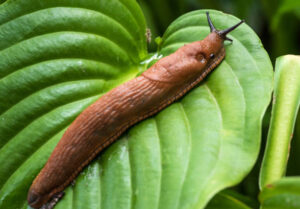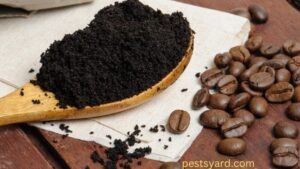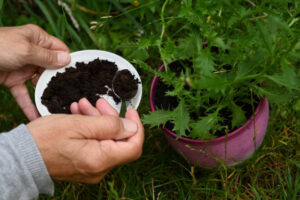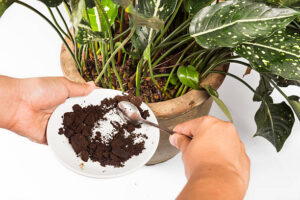If you have slugs and snails in your lawn, it is time to get rid of them before they can damage your plants. There are many different ways that you can use to get rid of these pests with coffee alone.
It is certain you are looking for simple and effective ways to get rid of them. Whether inside or outside, both are pesky creatures that can cause quite a bit of damage to your plants and soil if left unchecked.
The best thing to do is to find quick methods by which you can get rid of your pest problem without having to resort to toxic chemicals or taking hours upon hours hanging around the garden.
If you’ve been facing problems with slugs and snails in your garden, I’m sure that you are looking for simple and effective ways to get rid of them. Whether inside or outside, they are dangerous creatures that can cause quite a bit of damage to your plants and soil if left unchecked.
The best thing to do is to find quick methods by which you can get rid of your pest problem without having to resort to toxic chemicals or taking hours upon hours hanging around the garden. I have listed some effective natural remedies that will help you eliminate these pests forever.

Chances are you’ll end up dealing with these pests again, so I wanted to share some simple tips on making caffeine spray for slugs to keep them away.
The caffeine spray for slugs is an effective and easy-to-use natural remedy for controlling slugs. It is also a healthy, safe, and eco-friendly option to control slugs in the garden. Making a caffeine spray for slugs is surprisingly easy. Mix up equal parts coffee powder with equal water and spray your garden.
This method works well if also you want to repel these pests and keep your garden safe from these pests. If you are tired of the ever-growing infestation of slugs, it’s time to take action. You can start by making your coffee-based toxin spray. It’s just that easy.
Why coffee repel slugs and snails
Coffee is full of antioxidants and other compounds that help to repel pests. It is an effective way to keep slugs and snails at bay.
The reason coffee work is because it’s a mild alkaloid that doesn’t taste great (in fact, it’s bitter), so slugs and snails don’t want to eat it. The caffeine in coffee also acts as an irritant on the mucous membranes of their bodies, which can make them feel sick or uncomfortable. They also soak up moisture from the soil, making them less appealing to these pests.

It’s also been shown to kill off other pests like aphids, cockroaches, ants, spiders, and more. Also, the caffeine causes changes in the snail’s body chemistry, making it more likely to die when exposed to coffee grounds.
The more coffee grounds you use, the more effective they will be at repelling these pests. If you’re concerned about your plants being affected by coffee grounds, try sprinkling them around instead of directly on top of them.
Also, these pests don’t like the taste of coffee beans or grounds. They can’t even digest them if they eat them. Coffee beans contain tannin, which makes them bitter, so they’re repelled by the bitter taste and tannin compounds within the bean.
How to make caffeine spray for slugs
Caffeine is a great way to get rid of slugs. It will kill the slugs and their eggs, so you don’t have to worry about returning them. Caffeine is a stimulant that’s been used as a way to keep slugs away for years. Caffeine is a natural stimulant found in coffee, tea, and cocoa.
The caffeine in coffee and tea is harmful to slugs; A spray made from coffee buds contains caffeine, which has been known to kill slugs. It’s easy to make, and you can find all the ingredients at your local grocery store. Here’s how to make it:

You need:
- Equal parts of Coffee grounds (or tea)
- An equal part of the water
- A spray bottle
Step 1: Get a spray bottle. You’ll need something designed for making household cleaning products like this one (or any other spray bottle you have on hand).
Step 2: You’ll also need some coffee grounds available in most supermarkets.
Step 3: Add equal amounts of water to your spray bottle and mix in the coffee grounds powder until they dissolve into the liquid. Then add some more water if necessary until your mixture reaches a consistency that’s not too runny nor too thick; you want it to be able to coat the entire surface area of your slug.
Step 4: Spray this mixture onto areas where slugs might be hiding or congregating, like under shrubs or around outdoor planters where they can get inside through small gaps, and watch as they’re gradually killed over time.
Alternatively: You can use caffeine-based fertilizer for your soil before planting anything this spring. You’ll be able to enjoy your newly planted crops without worrying about dealing with pesky little critters.
How to get rid of slugs and snails with coffee
If you have a slug or snail problem, you can use coffee grounds as an organic pest control method. Slugs and snails are often nocturnal, which means they’re most active at night. Because they’re usually out and about when it’s dark, coffee can be your ally in warding them off.
Caffeine works by causing the slug or snail to lose its balance, causing it to fall off its shell or the plant it’s on. Coffee has a very strong aroma that drives off slugs and snails. It is an organic pesticide that will kill slugs and snails.

You can use coffee grounds as bait or sprinkle them around where you see the slugs and snails and around the edges of your yard if you want to keep them out of the plants.
You can also mix up some soapy water with some dish soap and pour it over those areas as well—this will help prevent future infestations by keeping any eggs that might have been laid there from hatching out into new slugs or snails.
Just use enough coffee so that when you pour it into your garden, there’s enough left in the pot for your plants to soak up some of it through their leaves before watering or fertilizing them again later on down the line.
Do Not Spray the Caffeine spray Directly On Your Plants.
Caffeine spray can be dangerous for your plants.
You might think it’ll be fine to spray directly on your plants because it’s caffeine. But this is not the case; spraying caffeine directly onto your plants can cause damage that could kill them.
Spraying too many coffee grounds directly on your plants will do more harm than good. Coffee grounds contain caffeine, a natural stimulant that can be harmful if sprayed on your plants.
The caffeine in coffee is absorbed by the roots of the plant and causes them to grow faster. However, this can cause them to overheat and die, causing stress for the rest of the plant’s system.
Caffeine is a stimulant that can be toxic to some plants if you apply it directly to their leaves. The root systems of plants absorb the caffeine from the soil and then deliver it into their leaves through their roots. If the caffeine is sprayed onto the leaves, it will be absorbed into these plant roots, which can cause serious damage.
Use Caffeine Spray for Slugs after Rain and in the Evening
After a downpour, slugs are likely to be on your lawn. This is because they love moist soil and an abundance of moisture. And this is the perfect time to use your spray. Using this spray before it rains or when it is sunny can make it less effective.
When using caffeine spray in your yard, make sure you’re using it at the right time of day. Evening and towards the night is the best time to use caffeine when the plants are asleep and not in sunlight.
If you’re spraying at night, ensure your leaves don’t have any open wounds or injuries before applying the spray so that they don’t get any more caffeine than necessary.

Are there any advantages of using coffee in your garden?
Coffee grounds are an excellent fertilizer for your plants. They contain nitrogen, which will help your plants thrive and grow. They also have trace minerals that can benefit your garden’s health. If you are looking for a way to replenish the nutrients in your soil, coffee grounds can help.
The best part about using coffee grounds in your garden is that they are natural and organic, so there is no risk of chemical residue on the roots of your plants if you use them as mulch or compost.
Coffee grounds are rich in nitrogen, which helps plants grow and thrive. They also contain phosphorus, an essential nutrient that helps plants establish roots and absorb water.
You’ll need to compost the coffee grounds before applying them to your garden, but once they’re ready, you can mix the coffee grounds into your soil or add them to your compost pile.
The benefits of using coffee grounds in your garden are many, and they include the following:
- Coffee grounds naturally add nitrogen to the soil, which helps plants grow faster.
- Coffee grounds contain tannins that help prevent fungal diseases and plant-insect damage.
- Coffee grounds are a natural fertilizer for green plants, so you don’t need to buy chemicals or fertilizers when using them.
- Coffee grounds are rich in potassium and magnesium, which are important for the hardiness of plants and flowers.
Disadvantages of using coffee grounds in your garden
Coffee grounds are a great way to add nutrients and improve your garden’s soil. They are rich in nitrogen, phosphorus, potassium, and magnesium, all essential for healthy plants.
But there are some downsides to using coffee grounds in your garden. For one thing, when you use them as fertilizer, the soil’s acidity will change.
Another issue is that coffee grounds can clump together and turn into a hard layer on top of the soil. This makes it harder for roots to grow through the topsoil and reach down into deeper layers where they can find more nutrients.
There are a few disadvantages to using coffee grounds in your garden.
- Coffee grounds contain high amounts of nitrogen, which is great for growing plants but can also encourage the growth of weeds.
- It is acidic and can burn plants if they are not watered properly.
- Coffee grounds can get stuck in the soil and prevent water from getting through to the roots.
- It can attract pests such as rodents or rabbits.
- Coffee grounds can impact the pH balance in the soil. This can cause problems with plant growth and fertility if it’s too acidic or alkaline.
- It can also affect the availability of nitrogen, which is important for many types of plants.
- Coffee grounds contain caffeine and tannin, both toxic to some plants. For example, young rose bushes may be killed if too much caffeine is present in the soil around them. If you want to use coffee grounds in your garden, ensure you don’t kill any plants before they even start.
If you’re concerned about these issues, you can try mixing your coffee grounds with compost or manure before planting them. This will help eliminate some problems with using coffee grounds in your garden while allowing them to provide fertilizer for your plants.
Best Slug Repellent
Monterey Sluggo Wildlife and Pet Safe Slug Killer
The Monterey is a safe and effective solution to deter slugs, snails, and caterpillars. It kills 100% of all target pests, including slugs, snails, springtails, and caterpillars. This product is a large sprayer available in various sizes to cover sufficient ground to ensure slugs are repelled by the strong smell.
The strong repellent is ideal for any garden, home, or property, as well as public areas where pests are found, such as parks and beaches. It’s an environmentally friendly option that protects you from having to use chemical sprays.
Bonide Products Slug Magic
Slug Magic is a ready-to-use, water-based slug, snail, and snail kite repellent with a unique soybean oil base. This formulation is 100% safe for pets and children. It is non-toxic and nonstaining, containing no harsh chemicals or ingredients that can harm humans. Slug Magic has long residual effectiveness and has been tested by scientists at Michigan State University without any harmful negative effects on the animals involved.
Slug Magic uses a mixture of natural ingredients to provide high levels of control on slugs, snails, sow bugs, pillbugs, and gophers while they feed.
Safer Brand Slug & Snail Killer
Give your garden the protection it needs. SAFER Brand Slug & Snail Killer is available in one convenient container and can be used in multiple ways, including as a safe slug trap and an easy-to-use poison formula that kills slugs, snails, and slugs.
Safer Brand Slug & Snail Killer contains pallets, an easy-to-use home pest control product. The unique formulation of this product will kill slugs and snails off your garden and lawn, making it a safe and effective way to keep your lawn and garden looking neat. It can be used in the garden, lawn, or flower pots and is completely safe to use around children.
Other Homemade slug repellents
There are other homemade methods to deter and get rid of slugs from your garden. These methods are also effective and economical and help keep your plant healthy.
Using Petroleum Jelly to Repel Slugs
Petroleum jelly, found in most grocery stores, is one of the most effective slug repellents. It’s cheap and easy to use, and it only takes a few applications on the ground to protect your garden.
Petroleum jelly is made of hydrocarbons that are extremely sticky for slugs, which makes it perfect for trapping slugs in place while they try to escape.
Spread some petroleum jelly around your plants and then sprinkle some salt around them as well, this will help draw more moisture away from the area where you put down the jelly so that it stays cold throughout its entire drying process (which should be about 24 hours).
Petroleum jelly works by creating a barrier that prevents slugs from crawling on top of the surface you’ve coated. The glycerin makes the gel sticky enough for slugs to walk across it without sticking but not so much that they will get stuck in their tracks.
If they’re coming from inside, try putting a few drops of petroleum jelly onto the surface of your lawn before you mow it (or any other time during the day). This will ensure that no pesky buggers ever get near your soil again.

Companion Planting
Companion Planting is an easy way to grow plants together that are mutually beneficial. It’s the practice of planting plants close to each other, typically within 6 inches of one another.
The idea is that these companion plants will help each other thrive, so you can focus on growing your food instead of worrying about how pests and diseases might affect your crop.
- Add garlic and onions to your garden beds. These plants keep slugs away from their roots, where they like to lay their eggs.
- Plant tomatoes in rows next to each other. Slugs will avoid crossing between plants as much as possible, so if you make it hard for them to move around, they’ll stay away from your tomatoes.
- Add marigolds or other colorful flowers around the edges of your vegetable garden. Slugs don’t like bright colors too much, which will help keep them away from you and your veggies.
Other plants to repel slugs are
- Hydrangeas.
- Euphorbias.
- Lavender.
- Rosemary.
- Geraniums.
- Fern Plants.
- Japanese Anemone.
Seaweed
Seaweed is a great way to make your home more attractive and verdant. It also helps repel slugs and snails. If you have a garden, try sprinkling some seaweed around the base of your plants. If you don’t have a garden, spray the area where slugs are a problem with an organic household cleaner like Dawn or Comet.
The combination of the smell of the seaweed and the cleaner will be enough to keep them away for a few days.
Grind up some dried seaweed and sprinkle it around your plants. You can get seaweed anywhere, from the grocery store, a health food store, or even the ocean. Make sure you’re using dried seaweed, not fresh seaweed, which is more toxic.
If you want to be effective, try mixing some seaweed into your soil before planting your seeds so they will grow into a thicker mat that will keep slugs out of their roots as they grow.
Salt
Salt is a great way to repel slugs. If you live in an area with slugs, sprinkle salt around your plants. The salt will make the slug think it’s too salty to eat, so it’ll move on to something else.
It’s not harmful to humans or pets and cheap to make. You can sprinkle it on your garden or use it in your sprinkler system to keep the little pests away.
Mix 1 cup of salt with 2 cups of warm water and spray it on the plants around your garden. That should be enough to get rid of most of the slugs.
Vinegar for slug control
This is a great homemade slug repellent and a natural alternative to chemical-based slug baits.
Vinegar is an effective, natural way to repel slugs. Vinegar is a quick and easy way to keep slugs out of your garden. It’s cheap, it works, and it’s easy to make.
For those who slugs have plagued, here’s a remedy to keep them away. To use, mix 1 part apple cider vinegar with two parts water. Pour into a spray bottle and spray on plants at the base of your plants. This remedy is safe for humans, pets, and wildlife. It can even be used as a plaster for wounds.
Shake well before spraying on your yard or garden. The vinegar will kill the slugs on contact, so you don’t have to worry about them getting away. To prevent future infestations, apply the mixture every two weeks until all slugs are gone from your yard.



